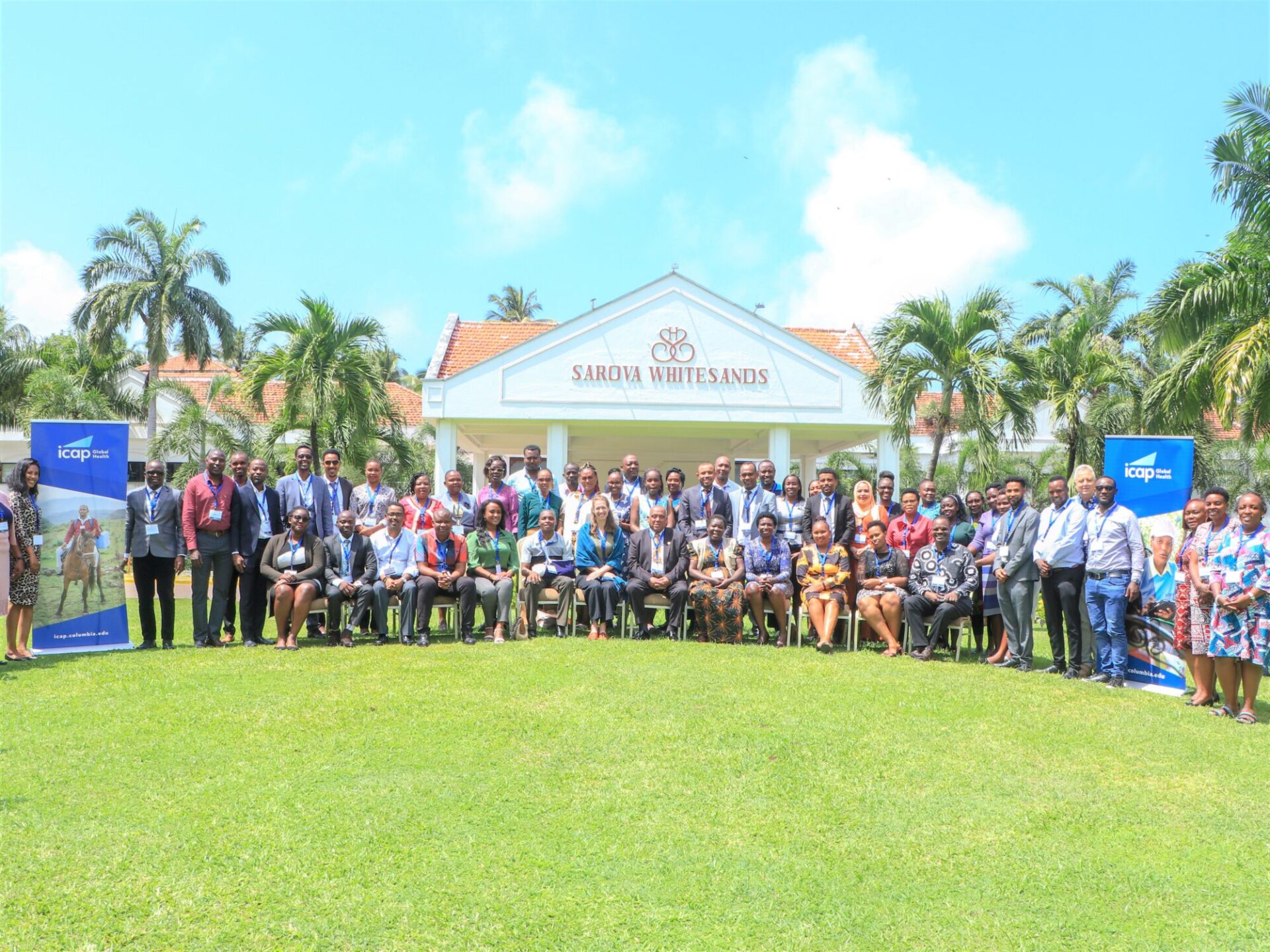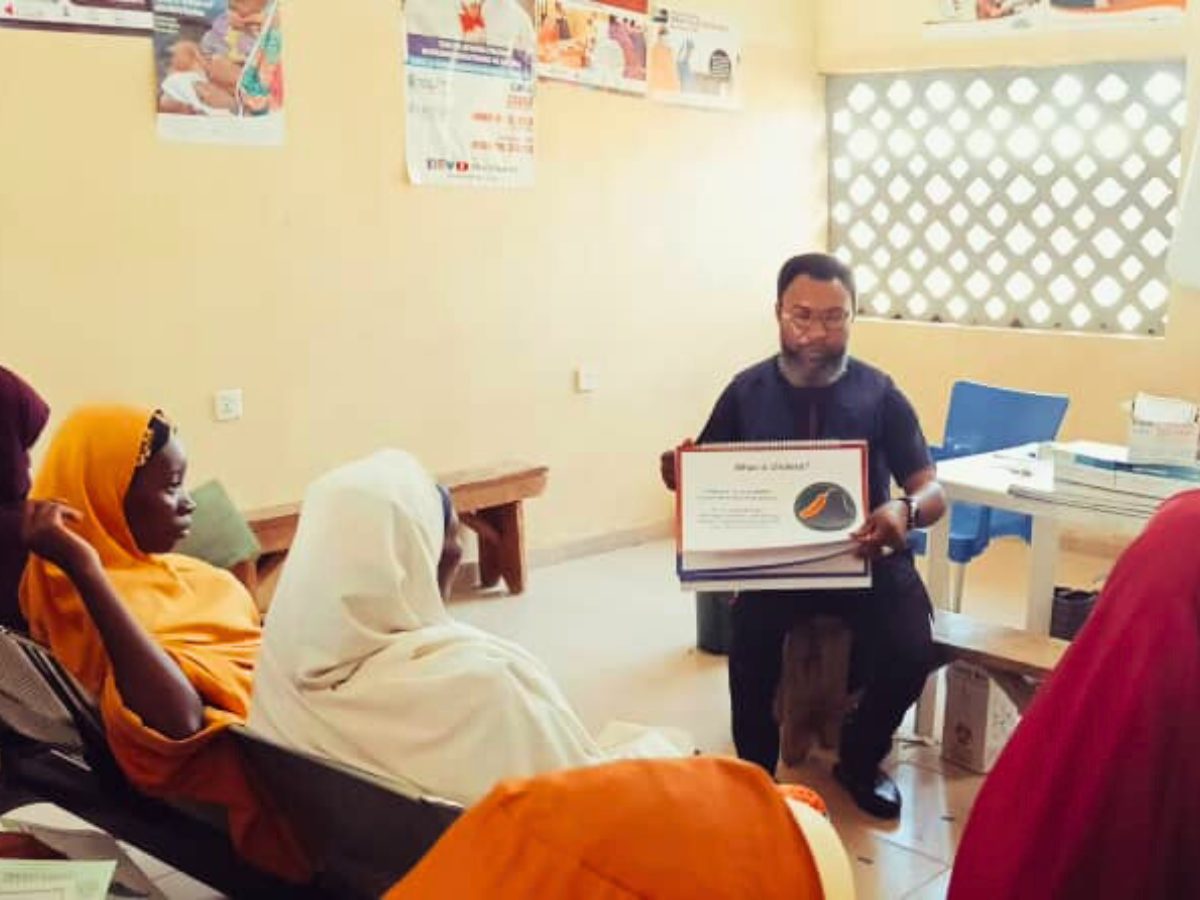Representatives from 20 hospitals and ministries of health in Ethiopia, Kenya, Tanzania, and Uganda gathered in Mombasa, Kenya, from August 1-3 to exchange lessons learned and strategies for infection prevention and control (IPC) compliance. The three-day meeting was organized by the East Africa IPC Network, first launched by ICAP in July 2020 when the COVID-19 pandemic made apparent urgent gaps in IPC practice and preparedness in the region’s health facilities.
Infection prevention and control, or IPC, refers to an evidence-based and practical approach to protecting patients and health care workers from contracting avoidable health care-acquired infections. Examples of infection prevention and control measures can include hand hygiene, the use of personal protective equipment (PPE), and injection safety at all levels of the health system.
“It’s all about making the health facility safe: safe for the patient, safe for the health care worker, and safe for other people attending to the patient,” explained Berhanu Tekle, who is ICAP’s IPC lead in Ethiopia.
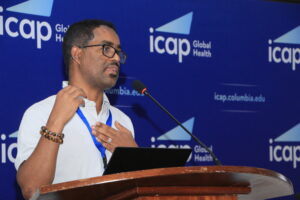
Getachew Kassa, MSc, MPH, DrBA, ICAP’s director for the project, addresses members at the meeting.
For the past three years, the East Africa IPC Network’s members—health care workers selected to be IPC focal points by their respective hospitals—have met regularly via weekly virtual learning and training sessions that also included opportunities for members to share experiences, knowledge, and lessons learned with each other as they worked to curb the spread of COVID-19 and other infectious diseases in their respective hospitals and countries. The initiative is funded by the U.S. Centers for Disease Control and Prevention’s (CDC) National Center for Emerging and Zoonotic Infections (NCEZID), as part of CDC’s International Infection Control Program.
“The goal of the East Africa IPC Network has been to reduce morbidity and mortality by preventing COVID-19 and health care-associated infections in low- and middle-income countries,” explained Getachew Kassa, MSc, MPH, DrBA, ICAP’s director for the project. “Its objectives have been to enhance the capacity of hospital-based IPC focal points to support compliance with IPC standards throughout their facilities by reinforcing knowledge of IPC standards and best practices, by building their capacity to design and lead quality improvement projects, and by fostering the exchange of best practices and innovation within and between countries via a robust regional learning network.”
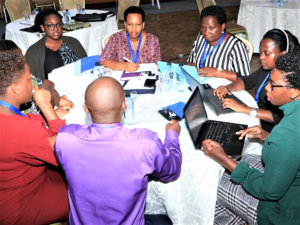
The Uganda team, including IPC focal points, the Ministry of Health, and ICAP, discuss their country action plan during a breakout session on day three.
The IPC focal points initially came to the network with a variety of backgrounds, according to Laura Block, MS, MSc, MBA, ICAP’s senior program officer for this project.
“Some are doctors, some are nurses, some have backgrounds in environmental health professions,” she said. ICAP’s strategy was to build IPC standard compliance at the participating hospitals through capacity building training via a virtual platform, as well as in-person supportive supervision and mentoring.
Although the network began in response to the pandemic and its effect on health facilities in the region, its focus on strengthening the ability of health facilities and their staff to meet IPC compliance standards enabled country teams to meet other emerging health challenges. For example, ICAP—in partnership with Uganda’s Ministry of Health—hosted a webinar in October 2022 for network members during the height of an Ebola virus outbreak.
Uganda’s network members “were able to share their on-the-ground, real-time experience with Ethiopia, Tanzania, and Kenya, whose countries were responding by closing borders and tightening regulations to make sure it didn’t spread across borders,” Block recalled. “It was the most well-attended webinar with over 80 participants and an indication of how the network could accommodate and share expertise across the network.”
The August meeting marked the first time that participants had gathered in-person since the network’s inception, and brought together not only IPC focal points, but facility leadership and representatives from the four ministries of health from the respective countries. Each country team brought with them IPC case studies and selected best practices and tools to share with the rest of the network.
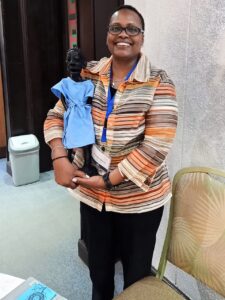 Tumbi Hospital in Tanzania presented on one innovative IPC compliance tool it had developed that was popular with meeting participants: the so-called “ugly trophy.” In order to continually engage staff and maintain IPC compliance, the hospital’s leadership has two types of trophies it awards on a quarterly basis to its different departments. One trophy is ceremoniously handed out by their medical director as an award for maintaining high quality standards and compliance. The other is a doll, the ugly trophy, they give to the least performing department, which they must place in front of their office.
Tumbi Hospital in Tanzania presented on one innovative IPC compliance tool it had developed that was popular with meeting participants: the so-called “ugly trophy.” In order to continually engage staff and maintain IPC compliance, the hospital’s leadership has two types of trophies it awards on a quarterly basis to its different departments. One trophy is ceremoniously handed out by their medical director as an award for maintaining high quality standards and compliance. The other is a doll, the ugly trophy, they give to the least performing department, which they must place in front of their office.
“It’s all about reinforcing habits,” said Ogongo, in a way that is both comical but also innovative. These days, however, she said the doll mostly sits unclaimed in Tumbi Hospital’s quality improvement office, “because all these departments are now performing as they should.”
“The workshop was successfully implemented and managed to share the network achievements, lessons learned, and turn best practices into ‘recipes’ that will be used to address prioritized areas and develop action plans for improvement and to recommend opportunities for future joint learning,” Kassa said.
On the final day of the meeting, country facility teams sat with their ministry of health representative and their ICAP focal point to brainstorm key changes and improvements for IPC compliance at the facility- and country-level, resulting in an action plan that representatives could bring back to their respective ministries for developing national-level policy and guidelines.
“The East Africa IPC Network provided a platform for these health care professionals to come together, learn, and to share not only the good things they are doing but also the challenges they are coming across,” said Irene Ogongo, BScN, RN, ICAP’s regional IPC advisor. “Before this project, they didn’t even know each other within their own countries, let alone across countries.”
Though the project is due to wind down in September, Ogongo predicted that the network will live on, in part because of the frequent communication between members via the WhatsApp and email messages she is copied on.
“People are sharing resources with each other because now we know each other,” said Ogongo, who has 19 years’ experience in nursing and health systems management. “That takes off a lot of frustration for someone who is trying to do their job well but who doesn’t have the resources.”

Boniface Thuranira (far left) is the IPC focal point for Maua Methodist Hospital in Kenya.
“A Golden Opportunity”
Boniface Thuranira had only worked as a registered nurse for seven months when he was made the IPC focal point for Maua Methodist Hospital in Kenya in June 2020. For three months he struggled to learn about and implement IPC procedures at the facility.
“With zero knowledge on IPC, it was hard to initiate a program which was non-existent in a level 4 hospital,” Thuranira recalled. “When ICAP came in to partner with our facility on IPC matters, this became a golden opportunity.”
“A journey that seemed impossible became lighter and lighter when the IPC study platform was unveiled, and slowly, with consistency in reading and assignments, what seemed hard has now become part and parcel of my life,” he said.
Within three years, he has established what he calls a “robust IPC program” at Maua Methodist Hospital, including an IPC committee.
“After realizing that IPC is the backbone of health care success, my focus now is to go back to school to gain more knowledge and join the leading world health institutions to make more policies to streamline IPC standards in the health sector,” Thuranira said.
About ICAP
A major global health organization that has been improving public health in countries around the world for two decades, ICAP works to transform the health of populations through innovation, science, and global collaboration. Based at Columbia Mailman School of Public Health, ICAP has projects in more than 40 countries, working side-by-side with ministries of health and local governmental, non-governmental, academic, and community partners to confront some of the world’s greatest health challenges. Through evidence-informed programs, meaningful research, tailored technical assistance, effective training and education programs, and rigorous surveillance to measure and evaluate the impact of public health interventions, ICAP aims to realize a global vision of healthy people, empowered communities, and thriving societies. Online at icap.columbia.edu


